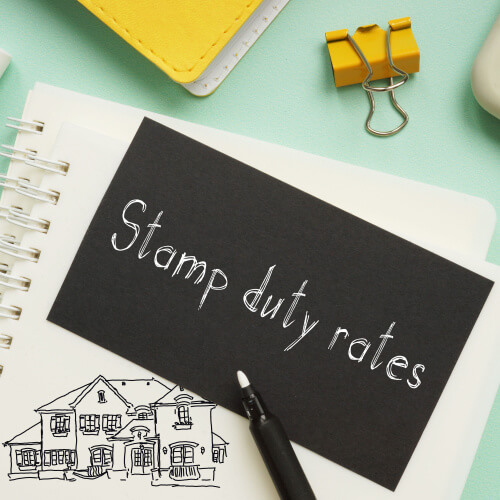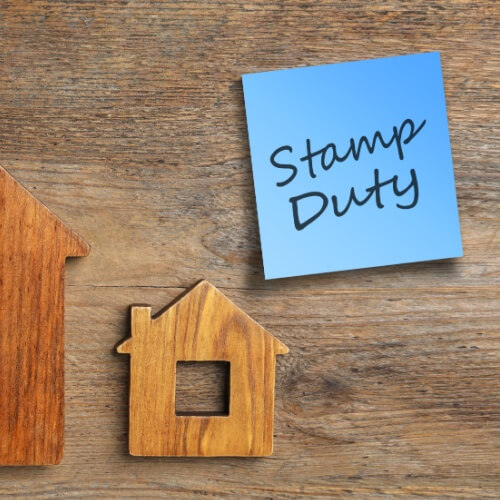 Written by James Hurwood
Written by James Hurwood
Edited by Eliza Buglar
Reviewed by Stephen Zeller
Last updated 20 May 2025
Don't quite understand stamp duty? You might want to watch this explainer from Selling Houses Australia host, Andrew Winter.
![]()
As General Manager of Money at Compare the Market, Stephen Zeller wants to help first homebuyers understand what their upfront property buying costs might look like, as well as reduce them where possible. With that in mind, here are his top three tips regarding stamp duty in New South Wales:
Stamp duty charges will differ depending on where you’re buying real estate in Australia. When calculating your stamp duty, make sure you’re using the right set of state- or territory-based rates and concessions, otherwise you could be in for a nasty surprise when it comes time to pay your transfer duty.
Don’t forget stamp/transfer duty when you’re accounting for all of your upfront property buying costs. As it could potentially cost you thousands, if not tens of thousands of dollars, it’s not an expense you want to forget about.
Use our stamp duty calculators to get an indication of the costs which may be applicable to your scenario. If you’re unsure how much stamp duty you may need to pay, feel free to contact us and one of our expert mortgage brokers will be able to assist you.
NSW’s transfer duty rates and thresholds are reassessed every year by the NSW Government to ensure they’re moving in line with any changes to Australia’s Consumer Price Index (CPI). NSW’s standard transfer stamp duty applies to any transfer of land or properties valued at under $3,636,000, while premium rates apply for properties of greater value.
If you purchased property or land in a previous year, it’s likely the amount of stamp duty you paid will be different from the current rates as these have changed several times in the past few years. Using the NSW stamp duty calculator built into our home loan comparison tool can give you a better idea of what you might pay overall in duty fees.
The current standard and premium stamp duty rates in NSW (as of March 2025) are listed in the table below:1
| Property value | Transfer duty rate |
| $0 to $17,000 | $1.25 for every $100 (minimum $20) |
| $17,000 to $36,000 | $212 plus $1.50 for every $100 over $17,000 |
| $36,000 to $97,000 | $497 plus $1.75 for every $100 over $36,000 |
| $97,000 to $364,000 | $1,564 plus $3.50 for every $100 over $97,000 |
| $364,000 to $1,212,000 | $10,909 plus $4.50 for every $100 over $364,000 |
| Over $1,212,000 | $49,069 plus $5.50 for every $100 over $1,212,000 |
Say you buy a home for $600,050. According to the duty rate brackets above, this means you’d pay a $10,909 base rate plus $4.50 for each $100 over $364,000. To figure out how much stamp duty you’d pay all up, we’ve got some calculations to do.
Step 1. Figure out how many blocks of $100 there are between $364,000 and the dutiable value of $600,050.
There’s a $236,050 difference between the two figures: $100 goes into that 2,360 times, and the additional $50 is treated as the full $100 as well. This means there are 2,361 blocks of $100 we need to use for the stamp duty calculation.
Step 2. Multiply 2,361 by $4.50 to calculate the second half of your stamp duty
2,361 x $4.50 = $10,624.50
Step 3. Add the two components of your stamp duty together
$10,909 + $10,624.50= $21,533.50
This means that on top of the purchase price of $600,050, you’d pay approximately $21,533.50 in stamp duty costs. However, it’s important to note that your house-buying costs don’t end there – you may also have to pay for things like:
In NSW, stamp duty is payable on the transfer of various property types. You’ll typically pay stamp duty if you’re purchasing:
However, depending on your circumstances, you could be eligible for certain stamp duty concessions or even a complete stamp duty exemption.
Exemptions and concessions are usually based on the property price but can also be granted under special circumstances (such as inheriting a deceased estate or title transfers between married or de facto couples). They’re also commonly available to those buying a home for the first time.

Unless they’re eligible for a stamp duty exemption of some kind, anyone purchasing property in NSW will have to pay stamp duty on their property transaction.
The seller of the property does not have to pay stamp duty, as the property is not being transferred into their name.
In NSW, stamp duty is payable if you purchase vacant land of any kind, whether it be residential, commercial or industrial. Depending on your individual circumstances, you could be eligible for an exemption if the land’s market value is less than $350,000, or a stamp duty concession if it’s valued between $350,000 and $450,000.
It’s worth noting that you may still need to pay stamp duty in NSW if you acquire land as a gift or through a trust, meaning you can end up with stamp duty payable even if you didn’t purchase the land yourself.
Foreign buyers, companies and trusts purchasing residential property in NSW must pay transfer duty and may be subject to an additional 9% surcharge purchaser duty.2 However, there are a number of available exceptions which could apply.
You won’t need to pay the additional charge if you’re an Australian citizen, Australian permanent resident, New Zealand citizen (holding a subclass 444 visa) or have a valid 309 or 820 partner provisional visa.
First home buyers in NSW may be eligible for either concessional rates or a total exemption, in accordance with the NSW First Home Buyers Assistance Scheme (FHBAS).³
These stamp duty breaks depend on the value of the property and whether you’re purchasing a new home, established home or vacant land.
The NSW stamp duty exemptions and concessions for first home buyers (as of March 2025 are listed below:⁴
| New and existing homes | Vacant land |
|
|

In NSW, stamp duty must be paid within three months of signing the contract for the sale, or transfer of the property. However, if you make an off-the-plan purchase (i.e. purchasing property where the home isn’t yet built), you may be able to delay paying stamp duty for up to 12 months.
If you have a solicitor or conveyancer acting on your behalf, they will typically handle this process for you. That being said, stamp duty will typically be paid on the settlement day by your solicitor or conveyancer if the property purchase involves a home loan. With that in mind, the three-month grace period afforded to property buyers may only be useful for those who can afford to buy outright, without needing finance.
Stamp duty payments are addressed to NSW’s revenue office either in person, via electronic funds transfer, BPAY, advance payment or by mail. For further information on how to pay your stamp duty and how non-payment could affect you, check with Revenue NSW.
However, if you have a solicitor or conveyancer acting on your behalf, they will usually handle the payment process for you.
![]()
Stephen has more than 30 years of experience in the financial services industry and holds a Certificate IV in Finance and Mortgage Broking. He’s also a member of both the Australian and New Zealand Institute of Insurance and Finance (ANZIIF) and the Mortgage and Finance Association of Australia (MFAA).
Stephen leads our team of mortgage brokers, and reviews and contributes to Compare the Market’s banking-related content to ensure it’s as helpful and empowering as possible for our readers.